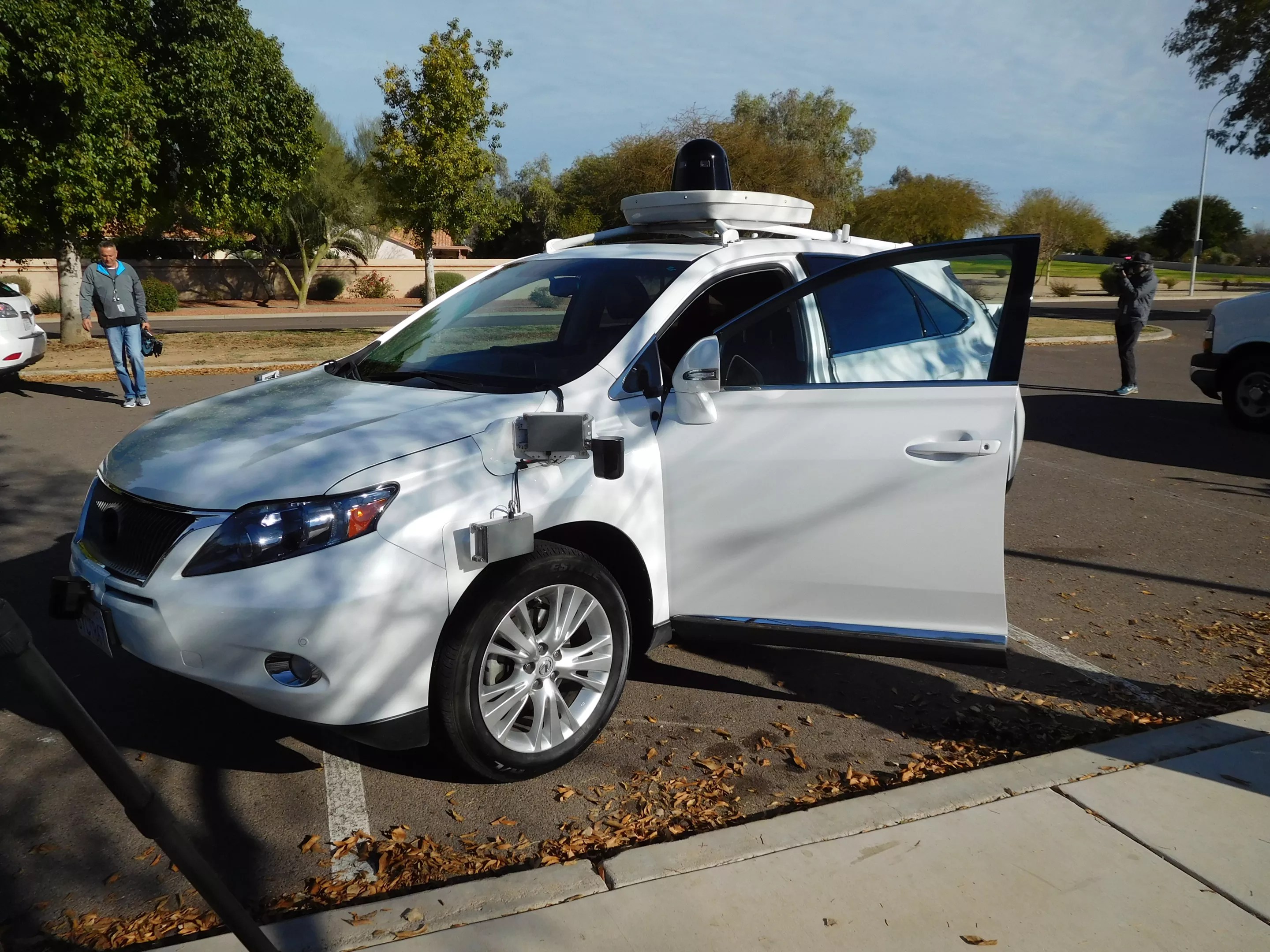
Ray Stern

Audio By Carbonatix

Waymo’s self-driving Lexus SUV.
Ray Stern
There were more than 100,000 car crashes last year statewide. If you take the Loop 202 downtown, this probably isn’t a surprise. The inevitable fender bender, side swipe, or even multiple-car pileup have slowed down your morning commute and maybe even made you take your foot off the gas as you rubber-neck to watch the tow truck take some poor, unfortunate soul to the auto shop.
What all of these crashes have in common is human error. The U.S. Department of Transportation estimated that 94 percent of crashes occur because of human error or distracted driving.
So, Waymo — formerly the Google self-driving car project — has found the answer. It’s time to eliminate human drivers.
This week, Waymo announced that the driverless cars that have been test-driving in Chandler will no longer have a person behind the wheel. That’s right — fully autonomous cars are coming to metro Phoenix.
One question remains, though. What happens if an autonomous vehicle gets into an accident?
Apparently that’s the answer Waymo, Arizona Department of Transportation, Maricopa Associations of Governments, Governor Doug Ducey’s office, and Chandler Police Department don’t have.
Eric Anderson, the transportation director for Maricopa Association of Governments, asked Waymo this question directly, he said.
The answer he received was that Waymo was insured and would assume all liability, at least during the testing stage.
Amanda Ventura, a Waymo representative from the marketing firm Evolve, could only kind of confirm this. The self-driving cars are insured and meet the applicable requirement for motor vehicles in Arizona, Ventura said in an email to the Phoenix New Times.
Aside from the governor’s 2015 executive order to allow self-driving vehicle testing and piloting, there aren’t any real rules for self-driving cars.
The order mandates that the Department of Transportation, Department of Public Safety, and all other agencies of the State of Arizona “shall undertake any necessary steps to support the testing and operation of self-driving vehicles on public roads within Arizona.”
Essentially, Arizona has agreed to step aside and see how this technology develops. If something goes wrong, well, there’s no plan for that yet.
In the past year, the Chandler Police Department recorded three accidents involving autonomous vehicles, Detective Seth Tyler said.
Two of the three were not the fault of the autonomous vehicle. The third accident occurred when the driver of the autonomous vehicle took control and made an illegal left turn. That driver was cited, Tyler said.
As of now, there is no protocol in place for if and when a Chandler PD officer rolls up to an accident scene and there is no driver to cite, Lieutenant David Ramer said.
“We’ll just deal with it as we go,” Ramer said. “I’m not sure how quickly this will ramp up. Just like anything in law enforcement, we will adapt.”
Currently, Waymo has a fleet of 100 Chrysler Pacifica Hybrid minivans, which were introduced for the “early rider program” last spring. Gradually, this fleet will grow by another 500 as testing expands to being completely autonomous.
Ramer describes Chandler PD as being “cautiously optimistic” about the progress of autonomous vehicles. He’s aware there will be “hiccups here and there,” but he’s looking forward to a future without citations.
“The idea is that there will be no more speeders, no more wide turns, no red light violators, no driving under the influence,” Ramer said. “In a perfect world, that’s how it will work out.”
In the meantime, Arizona is on pace to exceed 1,000 traffic-related deaths this year. This would exceed last year’s number of 865, according to ADOT annual crash report.
Both ADOT and the governor’s press team pointed to this statistic and reasoned that these autonomous vehicles could significantly decrease the number of fatal crashes.
“The state of Arizona is continuously looking for ways to save lives and reduce accidents on our roads and highways,” Patrick Ptak, senior press secretary for the governor said. “Self-driving cars will ultimately be part of the solution, but more testing is needed.”
“Arizona treats self-driving vehicles the same as any other vehicle” — ADOT
Waymo technology is approaching nearly a decade of testing and has covered 3.5 million miles on public roads in addition to 10 million simulated miles daily, according to the Waymo press release.
During the testing period, autonomous vehicles are not seen as a public safety threat, ADOT’s public information office said in a statement.
“Arizona treats self-driving vehicles the same as any other vehicle: As long as they are obeying traffic laws and operating safely, they’re allowed to operate on the roads,” the statement said.
The main difference here, is that there are laws regulating drivers, laws that determine fault and seek retribution when accidents occur. There are not, yet, laws that determine who an officer tickets if and when an autonomous vehicle causes damage, injury, or death.
In short, technology is outpacing the law.